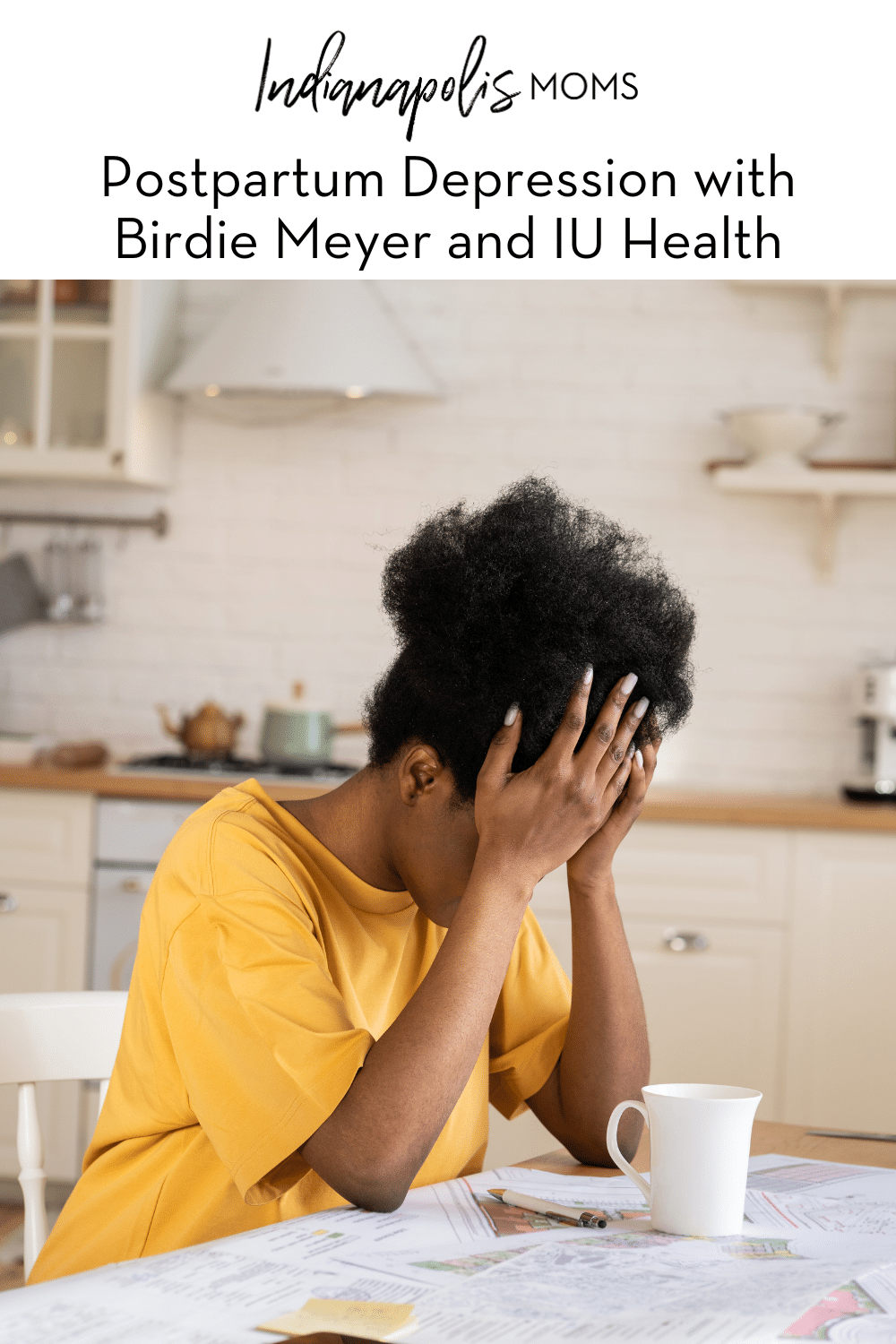Postpartum depression affects one in seven mothers, and this month during Maternal Mental Health Month, Indianapolis Moms is here to answer your questions on how to get help. We had the opportunity to discuss postpartum depression in depth with Birdie Meyer, founder of the Perinatal Mood Disorder Program at IU Health and instructor of IU Health North’s Fourth Trimester class. She is well known as an expert on all things fourth trimester, and her message to new moms with postpartum depression has always been the same – you are not alone, and you will be yourself again. It’s okay to ask for help.
First, we asked Birdie to introduce herself – she told us about her experience with IU Health and with postpartum mental health overall.
You may know Birdie Meyer from different venues as a longtime advocate for new mothers in their postpartum period. She is a nurse, a therapist, and was an employee of IU Health for many years. She started the Perinatal Mood Disorder Program in 1997, and after running the program for 25 years, she retired in 2018. But her work did not stop there! She continued to work with Postpartum Support International (PSI), working with moms, partners, and families.
We are grateful for your expertise on this important topic. Our first question is for moms in their fourth trimester – what are some signs of postpartum depression?
Meyer says some obvious signs that a mom is possibly suffering from postpartum depression are sleeping and appetite disturbances. You may be over-sleeping or under-sleeping. Your appetite may be affected in a negative way; you either rapidly lose weight from lack of appetite or have an unhealthy diet.
Meyer also lists depression, Obsessive Compulsive Disorder (OCD), anxiety, suffering a traumatic childbirth, and a newly diagnosed disorder as signs of postpartum depression. A large percentage of women acquire one of these illnesses and even if you’ve suffered from depression or anxiety before, it may look and feel different now because it’s not just about you – it’s about a baby.
“We tell people when they leave the hospital, ‘If you find yourself crying a lot, be sure to call your doctor.’ Well, not everybody is crying,” says Meyer. “Some of you are anxious or having scary or intrusive thoughts or reliving a disappointing or traumatic birth.” Those are the main symptoms to look out for as you are in your fourth trimester.
What are some lesser known symptoms that could indicate PPD?
Beyond the more obvious signs listed above, there are some signs that are either overlooked or not discussed prior to being discharged from the hospital. One of those signs is having scary or unusual thoughts, also known as intrusive thoughts. Meyer describes intrusive thoughts as a twisting of the part of your brain that usually signals comfort and protection for your child. You begin thinking what’s the worst that could happen and this can lead to what Meyer calls “the crazy what-if thoughts” such as what if I drop the baby?
A large percentage of new parents, 88% according to Meyer, have intrusive thoughts in the fourth trimester. Meyer continues by saying, “They’re really common, and yet we don’t mention them and then we think, I’m really losing it. What if I do these things?” Other lesser known symptoms include anger, irritability, rage, and a continuation of a previously diagnosed disorder, such as OCD. OCD can continue into the fourth trimester but the need for control is amplified.
Knowing what some of these signs can look like, as a partner or family member – what if you suspect your loved one is exhibiting signs of PPD?
Tread lightly, says Meyer. You don’t want to upset your partner even more by saying something is wrong with them. Meyer suggests that if you and your partner took a prenatal education class together, remind your partner of what the teacher discussed about postpartum depression symptoms. Ask them gently how they are feeling. Tell them that you are noticing symptoms discussed in class and that they haven’t acted like themselves since the baby was born.
Another great tip for partners is to gently emphasize that it’s okay to ask for help. Meyer suggests saying something similar to, “I am your partner in this and I want to be there for you, and let’s talk about a plan. I’m in this with you.”
Will you share with us some recommended resources for families to seek?
Meyer highly recommends, after discussing your symptoms with your OB/GYN, taking a quarterly class from IU Health North called the Fourth Trimester. Meyer teaches this class, and it is free to join. You can take this class if you are pregnant, in your fourth trimester, and even a few months after giving birth. Also, support groups are available throughout the state of Indiana. Check with Postpartum Support International for information on support groups in your area. On the PSI website, you can chat with a local Indiana support coordinator for more information, as well.
About Birdie Meyer
Birdie Gunyon Meyer is an registered nurse with a master’s degree in psychology and counseling. She is the founder of the Perinatal Mood Disorders Program at Indiana University Health. She is certified in Perinatal Mental Health, and is an internationally known expert and speaker.

Named among the “Best Hospitals in America” by U.S. News & World Report for 22 consecutive years, Indiana University Health is dedicated to providing a unified standard of preeminent, patient-centered care. A unique partnership with Indiana University School of Medicine – one of the nation’s leading medical schools – gives our highly skilled physicians access to innovative treatments using the latest research and technology. Learn more at iuhealth.org.









